How to get rid of snails: 6 natural ways to deter these common pests
Protect your precious plants by learning how to get rid of snails quickly and easily
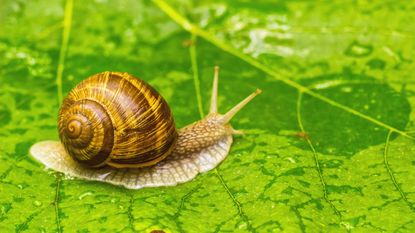

Most gardeners at some point or other want to know how to get rid of snails. These slimy pests may look relatively harmless – and indeed, in small numbers, they can be tolerated. But, once they've destroyed your precious plants overnight, you may feel obliged to take action and protect what's left of your raised beds or borders.
The good news is, there are lots of different methods that will keep these intruders under control – without having to reach for the chemicals. In fact, the natural methods for getting rid of slugs are mostly effective for snail prevention too, seeing as the two pests are incredibly similar.
How to get rid of snails – 6 simple methods to try
From learning how to get rid of wasps to how to get rid of ants, where there's a will there's a way, no matter what type of garden pest you're dealing with.
These tips will help protect your plants from snails, so you can enjoy the maximum amount of blooms and edible crops.
1. Scatter coffee grounds around your plants
As well as being a great ingredient for the compost heap, coffee grounds appear to discourage snails when used as mulch around vulnerable plants, such as hostas, says the Amateur Gardening experts. They don't like the abrasive texture, and in large quantities, the caffeine can kill them. And that's not the only benefit of coffee – it can help boost the growth of your plants, too.
'Coffee grounds are a useful source of organic matter and nutrients. It is thought that they are particularly beneficial to acid-loving plants. However, although roasted coffee is acidic, it seems that brewing reduces the acidity and the used dregs have a fairly neutral pH,' they explain.
'Add a thin layer of fresh grounds to the soil surface and rake or lightly fork into the soil to prevent the grounds from becoming moldy and a crust forming on the surface.' Just avoid using coffee grounds around seedlings and young plants, particularly those with shallow root systems like lettuces and radishes.
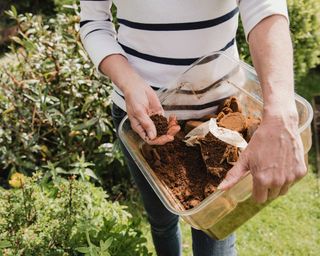
Old coffee grounds will keep pests away while giving your plants a boost
2. Set beer traps
If you're looking for a way to get rid of snails that suits organic gardening, then making beer traps can be a good approach.
The best liquid to use is real ale, as it has a higher yeast content, which attracts the intruders.
'Beer traps are useful, although other insects can also drop in,' says John Negus of Amateur Gardening. 'Pour the beer into an old pot and settle it in the soil with its lip above ground level so beneficial insects such as beetles are less likely to topple in and drown,' he says.
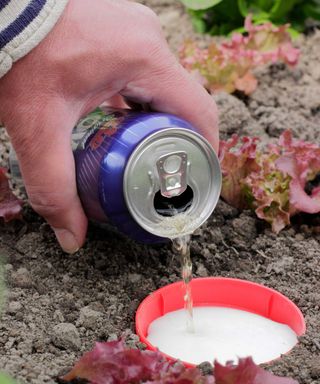
Catch snail intruders with beer traps
3. Try beneficial nematodes
Nematodes can be useful at tackling a variety of pests, including lawn grubs and aphids.
'You can buy a biological control called Nemaslug (available from Amazon), which contains nematode worms,' says John. It is thought that this can help tackle snails as well as slugs.
Water it onto the soil, and the microscopic worms will kill the interlopers. 'It is available online, and can be ordered through garden centers.'
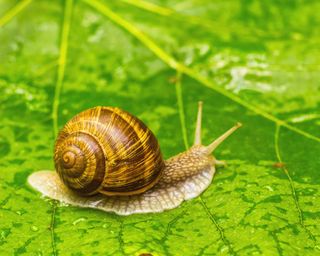
Nematodes can help control both slugs and snails
4. Surround your plants with copper rings
If you want to protect your container garden from snails, copper bands or tape – available on Amazon – are an affordable solution that many gardeners opt for.
'Copper strips can be stuck around the rims of containers,' says John. These are thought to deter the pests. Alternatively, you can push circular copper bands into the soil around the plants in your flower beds.
However, the effectiveness of this method has been somewhat debated, with the RHS finding no reduction in plant damage when trying them out in a recent study. But, as they're budget-friendly, what's the harm in giving it a go?
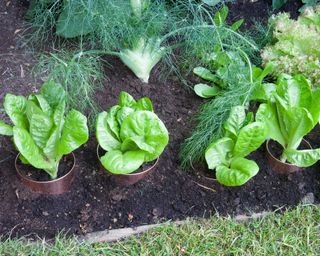
Keep the pests away from your crops
5. Pick them off by hand
If you're not too squeamish, you can pick snails off your plants by hand, collecting them up in a bucket (you can do this to get rid of earwigs, too). They can then be transferred to a compost heap, or, as the RHS suggests, to an area of the garden with less-vulnerable plants.
They are most active at night, especially if conditions are warm but damp, so venture out after dark with a flashlight in hand.
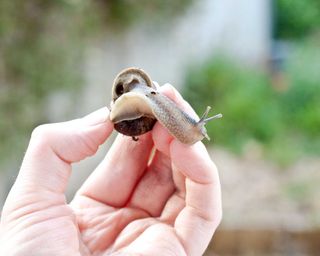
Collect up your snails and move them elsewhere
6. Encourage more birds to your garden
Many types of birds will prey on snails, as do other small creatures such as frogs, toads, and hedgehogs. So, consider bringing more wildlife garden ideas to your space to attract them – whether that's adding a pretty pond surrounded by plants, a bug hotel, or a bird bath.
There are more tips on how to attract birds to your garden in our guide.
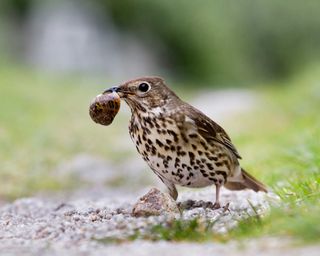
Many birds will prey on snails
How do you know if snails have been attacking your plants?
Snails leave slime trails – a tell-tale sign that they're in your garden. In terms of damage, they'll nibble large holes in the leaves, blooms, and fruits of plants. And they're not fussy – from veggies in your kitchen garden to dahlias in your flower beds, these pests will happily devour them all.
In fact, they'll also eat decomposing matter, such as leaf mold and mulch, and you may well spot them on your compost heap (although, of course, this is much more preferable than finding them on your plants).
They tend to come out after dark, and particularly like wet weather, says the RHS. Be especially vigilant in spring, when they will gravitate towards young seedlings and soft growth.
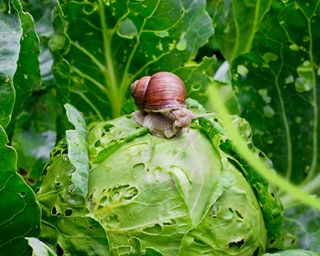
Snails will quickly nibble holes in your plants

The garden was always a big part of Holly's life growing up, as was the surrounding New Forest where she lived. Her appreciation for the great outdoors has only grown since then. She's been an allotment keeper, a professional gardener, and a botanical illustrator – plants are her passion.
-
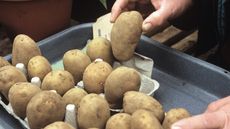 Do you need to chit potatoes? Find out what the experts say
Do you need to chit potatoes? Find out what the experts sayGrow Your Own Learn how to chit potatoes before planting them in the ground and you’ll be on your way to getting an earlier and bigger harvest
By Drew Swainston Published
-
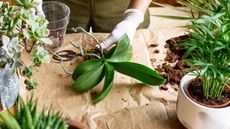 What causes orchid root rot and how do you solve it?
What causes orchid root rot and how do you solve it?Plants Discover the causes of orchid root rot so you can prevent this common problem from killing your plant
By Sarah Forsyth Published
